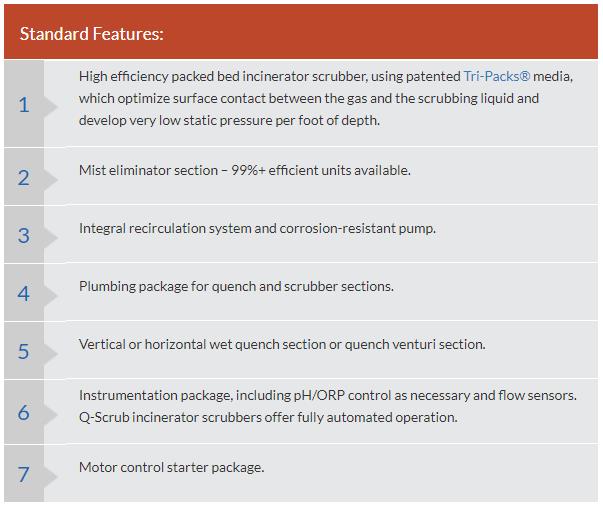Incinerator Scrubber
Q-Scrub Incinerator Scrubber delivers scrubber efficiencies of 95-99.99%. Systems can be engineered to guarantee any outlet rating.
Most stack gas emissions requirements are based on a mass emissions standard of lbs./hr. in vs. lbs./hr. out for contaminants such as HCl, Cl2, SO2, HF, etc.
Q-Scrub requires the lowest capital investment of any wet combination quench/scrubber system. Operating costs are minimized through neutralization of corrosive flue gases, efficient use of chemicals, and low pressure drop.
Materials of construction for the quench section include Hastelloy™ C276 and 316L to 304 stainless steel; high-temperature FRP is recommended for applications below 300°F. The scrubber section is manufactured in polypropylene, fiberglass or high alloy steel.
For applications involving the removal of submicron particulates, see CCS option, which can incorporate the Q-Scrub for total control of gas and particulate, including submicron particulate.
Tri-Mer Q-Scrub is effective for high-temperature furnace and incinerator filters applications, including:
- Rotary kilns
- Calcinators
- Multiple hearth furnaces
- Refractory furnaces
- Fluidized bed furnaces
- Biomass grate furnaces
- Catalytic combustion furnaces
- Waste-fired boilers
- Liquid injection incinerators
- Direct flame gas incinerators
- Hazardous waste incinerators
- Sludge incinerators
- Fume oxidizers
- VOC oxidizers

NOx Destruction:
Q-Scrub interfaces with Tri-Mer’s Tri-NOx® Multi-Chem® system where NOx must also be destroyed. Multi-Chem is the practical, efficient solution to NOx emissions from all sources, at all loadings.
